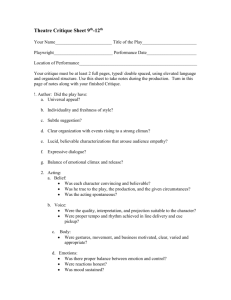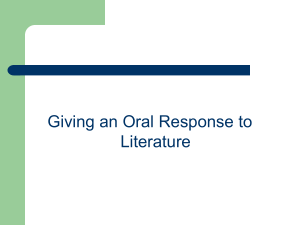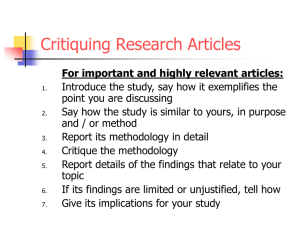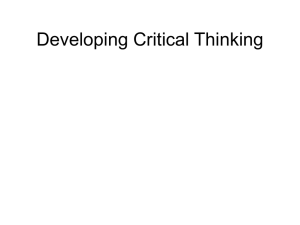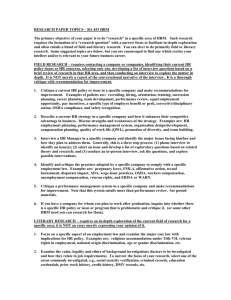English 357 Syllabus Fall 2010 - ENGL 357: Southern Literature
advertisement
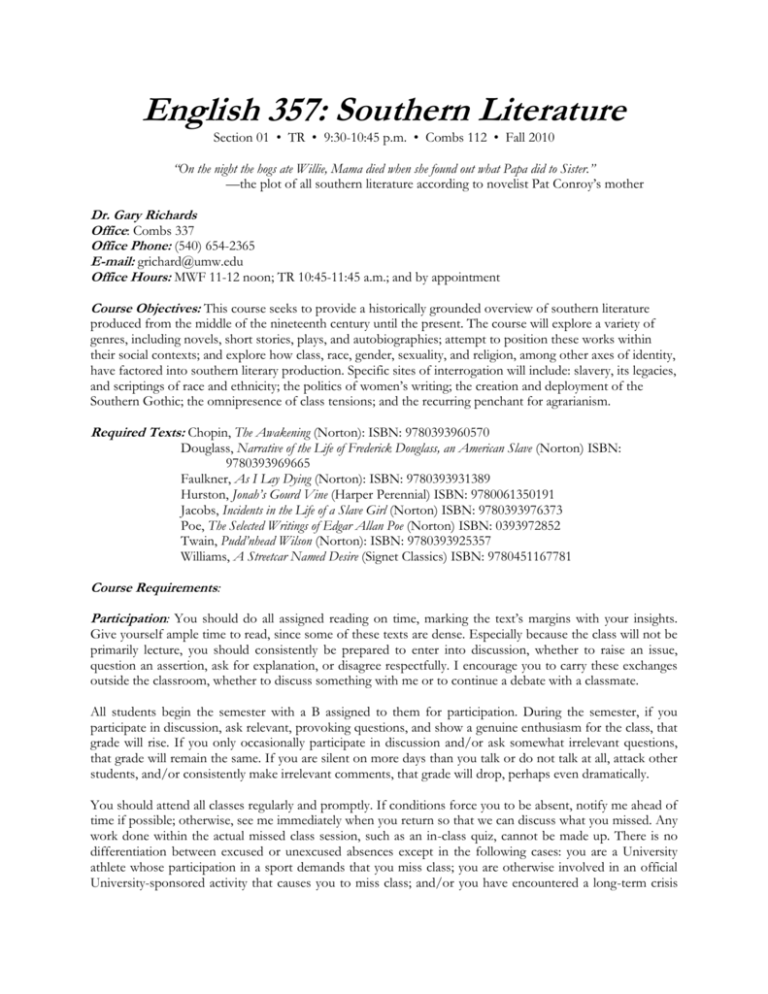
English 357: Southern Literature Section 01 • TR • 9:30-10:45 p.m. • Combs 112 • Fall 2010 “On the night the hogs ate Willie, Mama died when she found out what Papa did to Sister.” —the plot of all southern literature according to novelist Pat Conroy’s mother Dr. Gary Richards Office: Combs 337 Office Phone: (540) 654-2365 E-mail: grichard@umw.edu Office Hours: MWF 11-12 noon; TR 10:45-11:45 a.m.; and by appointment Course Objectives: This course seeks to provide a historically grounded overview of southern literature produced from the middle of the nineteenth century until the present. The course will explore a variety of genres, including novels, short stories, plays, and autobiographies; attempt to position these works within their social contexts; and explore how class, race, gender, sexuality, and religion, among other axes of identity, have factored into southern literary production. Specific sites of interrogation will include: slavery, its legacies, and scriptings of race and ethnicity; the politics of women’s writing; the creation and deployment of the Southern Gothic; the omnipresence of class tensions; and the recurring penchant for agrarianism. Required Texts: Chopin, The Awakening (Norton): ISBN: 9780393960570 Douglass, Narrative of the Life of Frederick Douglass, an American Slave (Norton) ISBN: 9780393969665 Faulkner, As I Lay Dying (Norton): ISBN: 9780393931389 Hurston, Jonah’s Gourd Vine (Harper Perennial) ISBN: 9780061350191 Jacobs, Incidents in the Life of a Slave Girl (Norton) ISBN: 9780393976373 Poe, The Selected Writings of Edgar Allan Poe (Norton) ISBN: 0393972852 Twain, Pudd’nhead Wilson (Norton): ISBN: 9780393925357 Williams, A Streetcar Named Desire (Signet Classics) ISBN: 9780451167781 Course Requirements: Participation: You should do all assigned reading on time, marking the text’s margins with your insights. Give yourself ample time to read, since some of these texts are dense. Especially because the class will not be primarily lecture, you should consistently be prepared to enter into discussion, whether to raise an issue, question an assertion, ask for explanation, or disagree respectfully. I encourage you to carry these exchanges outside the classroom, whether to discuss something with me or to continue a debate with a classmate. All students begin the semester with a B assigned to them for participation. During the semester, if you participate in discussion, ask relevant, provoking questions, and show a genuine enthusiasm for the class, that grade will rise. If you only occasionally participate in discussion and/or ask somewhat irrelevant questions, that grade will remain the same. If you are silent on more days than you talk or do not talk at all, attack other students, and/or consistently make irrelevant comments, that grade will drop, perhaps even dramatically. You should attend all classes regularly and promptly. If conditions force you to be absent, notify me ahead of time if possible; otherwise, see me immediately when you return so that we can discuss what you missed. Any work done within the actual missed class session, such as an in-class quiz, cannot be made up. There is no differentiation between excused or unexcused absences except in the following cases: you are a University athlete whose participation in a sport demands that you miss class; you are otherwise involved in an official University-sponsored activity that causes you to miss class; and/or you have encountered a long-term crisis that you are negotiating with the Division of Student Affairs. In each of these cases, you should provide me written documentation of the scenario so that the absences can be accommodated. After three absences, your grade for class participation will be penalized two full letter increments for each absence. If, at the end of the semester, for example, you have four absences and your grade for class participation is a B+, that grade will automatically drop to a D+. You can therefore seriously hurt your final grade in the class strictly on the basis of absences. You should maintain professional behavior while in the classroom. All cell phones and other personal electronic devices should be turned off, and laptops should be used only for the taking of notes. If you are otherwise detected using an electronic device during class, such as texting or emailing, I will assume that you have chosen not to participate in an engaged fashion in the day’s class and therefore, as with an excessive absence, will penalize your participation grade two full letter increments for each time you choose to use these devices during class. Note that this also applies if your phone rings during a class session. Please see me before an individual class session begins if special circumstances demand an exception to this policy. You should also be aware of and adhere to the specifics of the Honor System of the University of Mary Washington. Conferences and Office Hours: I urge students to meet with me in posted office hours or by appointment multiple times during the semester. The first of these meetings should be in the first week of class so that I can begin to recognize you and get a sense of who you are, why you are taking the class, and so forth. The second time should be when you are completing your term essay discussed below. Quizzes: There will be oral quizzes each Tuesday covering those texts since the last quiz, including those assigned for that day. Each quiz will be ten questions answerable with short written replies. Without exception, a quiz cannot be made up or taken early, and a missed quiz receives a zero. I will, however, count only the highest ten of the thirteen quiz grades. Blogging: Although I have created a blog for this class, I have minimized its centrality, especially since students have complained of late of classes having become too focused on blogs. I therefore hope the blog will function in two primary ways: as a site to manage electronic documents, such as the syllabus, handouts, summary/critics, and term papers; and as an arena for casual discussion of the assigned texts as well as southern literature and culture more broadly. Therefore, the only blogging that I am requiring of you is one post of a hundred words per week on any topic you choose, so long as it is related to the class. That might be a close reading of a particular passage, a bit of southern history or biography with accompanying graphics, a rebuttal of some point made in class, and so on. The weekly post should be made by Friday at 5 p.m. Each post automatically generates five points, meaning that just by blogging over the fifteen weeks you will earn a C for that 10% of the final class grade. That total can, however, increase by one point with each substantive (30-word) response you make to a post. Therefore, you can earn a perfect 100% for your blogging simply by making your fifteen posts and responding to twenty-five posts over the course of the semester. Summary/Critique: You will write a two- to three-page summary/critique of one of the assigned secondary sources. This will consist of three paragraphs: a summary, rich in quotations, that articulates the heart of the critic’s argument; a paragraph, again rich in quotations, identifying the argumentative strengths of the critic’s piece; and a paragraph, still rich in quotations, identifying the argumentative and/or formalistic weaknesses of the critic’s piece. You will submit a print copy to me as well as email a copy to me so that the summary/critique may be posted on the blog. Essay: You will write one formal essay of literary criticism that analyzes either Zora Neale Hurston’s Jonah’s Gourd Vine or Tennessee Williams’s A Streetcar Named Desire.. You will first select your primary text and articulate a tentative argumentative stance. Then, using the MLA International Bibliography or other database, you will select to read on your own one substantive article in a refereed academic journal devoted to the text you have chosen. Then, you will decide how your critical approach parallels or complicates one of the approaches you have encountered in the secondary readings from earlier in the semester. Then, you will write a formal essay of five pages excluding the Works Cited. The essay is to be word-processed, written according to standard MLA guidelines, and turned in (both in a print copy and via email) two days before the class session of the designated panel discussion devoted to that text. Because the class will be reading these essays to inform class discussion, they cannot be turned in late and must follow this deadline: for the panel discussion on November 16, the essay must be emailed by 5 p.m. November 14; for the panel discussion on November 18, the essay must be emailed by 5 p.m. November 16; for the panel discussion on November 30, the essay must be emailed by 5 p.m. November 28; and for the panel discussion on December 2, the essay must be emailed by 5 p.m. November 30. The essay should offer an original argument about the text you have selected and centrally cite the two secondary articles you have selected. Please meet with me during this multiple-stepped process but in particular before you start writing the essay. I have designated November 11 as a day for these consultations, but you can do so at any time that is convenient for you. For this final step, you should draw directly upon the secondary sources and the primary source, meaning that your Works Cited will contain three entries. Finally, you will serve as a member of a six-person panel to lead discussion of your six essays on the day designated on the syllabus below. The entire class will have read the essays and use them to inform that day’s discussion of the primary text. Examination: You will take a cumulative final taken in-class on. This examination will likely be a combination of quotations (significant passages discussed in class and/or with some sort of identifying element within in for which you will offer the author and the text), several short answers, and several short essays. I will offer details closer to the time of the exam. Grading: Through the semester, I will use a system of letter grades and plusses and minuses that correspond to the following percentages: A/95 A-/92 B+/88 B/85 B-/82 C+/78 C/75 C-/72 D+/68 D/65 F/50. An A denotes work that is truly exceptional; a B denotes work that is a strong completion of the assignment; a C denotes work that is an adequate completion of the assignment; a D denotes work that is a poor completion of the assignment; and an F denotes work that fundamentally fails to complete the project in meaningful ways. (Note that an F is different from a zero. If you do not turn in an assignment, it will receive a zero rather than an F.) If I assign a slash grade, such as a B-/C+, it is the average of the two. Thus, in this case, it would be 80%. Final grades will be assigned with the following correspondences: 93.3-100 = A; 90-93.3 = A-; 86.6-90 = B+; 83.3-86.6 = B; 80-80.3 = B-; 76.6-80 = C+; 73.3-76.6 = C; 70-73.3 = C-; 66.6-70 = D+; 66.3-66.6 = D; 0-66.3 = F. I will round up to the nearest tenth of a point, but I will not add any point or fraction of a point to any grade other than via this rounding. I will calculate final grades based on the following percentages: Participation: 15%; Quizzes: 20%; Blogging: 10%; Summary/Critique: 10%; Essay: 20%; Final: 25%. Students with Disabilities: If you have a disability that will impact your performance in this class, see me during the first week so that the proper documentation and accommodations may be received and made through the Office of Disability Services. You may also contact that office directly at (540) 654-1266. Syllabus Parentheses denote years; brackets denote page numbers. August 24: August 26: Introduction • Anonymous, “The Buried Alive” (1821) [SWEAP 759-62] • Edgar Allan Poe (1809-49), “How to Write a Blackwood Article” (1838; 1845) [SWEAP 173-90], “The Premature Burial” (1844; 1845) [SWEAP 356-67], “The Murders in the Rue Morgue” (1841; 1845) [SWEAP 239-66], “The Masque of the Red Death” (1842; 1845) [SWEAP 299-304], “Hop-Frog; or, The Eight Chained OurangOutangs” (1849) [SWEAP 421-28] August 27: Last Day to Add Courses August 31: Quiz #1 • Poe, “The Fall of the House of Usher” (1839; 1845) [SWEAP 199-216], “The Black Cat” (1843; 1845) [SWEAP 348-55] • John Carlos Rowe, from “Antebellum Slavery and Modern Criticism: Edgar Allan Poe’s Pym and ‘The Purloined Letter’” (1992; 1997) [SWEAP 904-20] Summary/Critique: Rowe ____________________________________ • Terence Whalen, from “Average Racism: Poe, Slavery, and the Wages of Literary Nationalism” (1999) [SWEAP 921-41] Summary/Critique: Whalen ____________________________________ September 2: September 7: Quiz #2 • Frederick Douglass (1818-1895), Narrative of the Life of Frederick Douglass, an American Slave, Written by Himself (1845) [NL 1-42; note this includes the prefaces by Garrison and Phillips] • Douglass, Narrative of the Life of Frederick Douglass [NL 42-80] September 9: September 10: Course-Drop Deadline September 14: Quiz #3 • Peter Ripley, “The Autobiographical Writings of Frederick Douglass” (1985) [NL 135-46] Summary/Critique: Ripley ____________________________________ • Robert B. Stepto, “Narration, Authentication, and Authorial Control in Frederick Douglass’ Narrative of 1845” (1979) [NL 146-57] Summary/Critique: Stepto ____________________________________ • William L. Andrews, “Frederick Douglass and the American Jeremiad” (1986) [NL 157-66] Summary/Critique: Andrews ____________________________________ • Deborah E. McDowell, “In the First Place: Making Frederick Douglass and the AfroAmerican Narrative Tradition” (1991) [NL 172-83] Summary/Critique: McDowell ____________________________________ September 16: • Harriet Jacobs (1813-1897), Incidents in the Life of a Slave Girl (1861) [ILSG 1-79] September 21: Quiz #4 • Jacobs, Incidents in the Life [ILSG 80-158] September 23: • Jean Fagan Yellin, “Written by Herself: Harriet Jacobs’ Slave Narrative” (1981) [ILSG 203209] Summary/Critique: Yellin ____________________________________ • Valerie Smith, “Form and Ideology in Three Slave Narratives” (1987) [ILSG 222-36] Summary/Critique: Smith ____________________________________ • Frances Smith Foster, “Resisting Incidents” (1996) [ILSG 312-29] Summary/Critique: Foster ____________________________________ • Sandra Gunning, “Reading and Redemption in Incidents in the Life of a Slave Girl” (1996) [ILSG 330-53] Summary/Critique: Gunning ____________________________________ September 27: Quiz #5 • Mark Twain (1835-1910), Pudd’nhead Wilson (18) [1-62] September 29: • Twain, Pudd’nhead Wilson [62-122] October 5: Quiz #6 • F.R. Leavis, “Mark Twain’s Neglected Classis: The Moral Astringency of Pudd’nhead Wilson (1956) [PW 257-70] October 7: Summary/Critique: Leavis ____________________________________ • Barry Wood, “Narrative Action of Structural Symmetry in Pudd’nhead Wilson” (1980) [PW 336-47] Summary/Critique: Wood ____________________________________ • Linda A. Morris, “Beneath the Veil: Clothing, Race, and Gender in Mark Twain’s Pudd’nhead Wilson” (1999) [PW 381-95] Summary/Critique: Morris ____________________________________ • Carolyn Porter, “Roxana’s Plot” (1990) [PW 395-411] Summary/Critique: Porter ____________________________________ • Kate Chopin (1850-1904), The Awakening (1899) [A 3-56] October 12: October 14: Fall Break • Chopin, The Awakening [A 56-109] October 19: Quiz #7 • Contemporary Reviews [A 161-73] • Nancy Walker, “Feminist or Naturalist?” (1979) [A 252-56] Summary/Critique: Walker ____________________________________ • Lee R. Edwards, “Sexuality, Maternity, and Selfhood” (1984) [A 282-85] Summary/Critique: Edwards ____________________________________ • Patricia S. Yaeger, “Language and Female Emancipation” (1987) [A 285-91] Summary/Critique: Yaeger ____________________________________ • Anna Shannon Elfenbein, “American Racial and Sexual Mythology” (1987) [A 292-99] Summary/Critique: Elfenbein ____________________________________ • Helen Taylor, “Gender, Race, and Region” (1989) [A 299-309] Summary/Critique: Taylor ____________________________________ • Elizabeth Ammons, “Women of Color in The Awakening” (1991) [A 309-11] Summary/Critique: Ammons ____________________________________ • William Faulkner (1897-1962), As I Lay Dying (1929) [AILD 3-78] October 21: October 26: October 28: November 2: November 4: Quiz #8 • Faulkner, As I Lay Dying [AILD 79-149] • Eric Sundquist, “Death, Grief, Analogous Form: As I Lay Dying” (1983) [AILD 286-304] Summary/Critique: Sundquist ________________________________________ • Doreen Fowler, “Matricide and the Mother’s Revenge: As I Lay Dying” (1991) [AILD 31528] Summary/Critique: Fowler ________________________________________ Quiz #9 • Richard Gray, “A Southern Carnival” (1994) [AILD 336-47] Summary/Critique: Gray ________________________________________ • Donald M. Kartiganer, “‘By It I Would Stand or Fall’: Life and Death in As I Lay Dying” (2007) [AILD 363-75] Summary/Critique: Kartiganer ________________________________________ • Zora Neale Hurston (1891-1960), Jonah’s Gourd Vine (1-101) November 9: Quiz #10 • Hurston, Jonah’s Gourd Vine (103-202) November 11: Consultation about Essay (individual conference rather than formal class session) November 16: Quiz #11 Jonah’s Gourd Vine Panel Discussion ______________________________ ______________________________ ______________________________ November 18: Jonah’s Gourd Vine Panel Discussion ______________________________ ______________________________ ______________________________ _____________________________ _____________________________ _____________________________ _____________________________ _____________________________ _____________________________ November 23: Quiz #12 • Tennessee Williams (1911-1983), A Streetcar Named Desire (1947) November 25: Thanksgiving Break November 30: Quiz #13 A Streetcar Named Desire Panel Discussion December 2: December 7: ______________________________ _____________________________ ______________________________ _____________________________ ______________________________ _____________________________ A Streetcar Named Desire Panel Discussion ______________________________ _____________________________ ______________________________ _____________________________ ______________________________ _____________________________ Summaries and Conclusions Final Examination (8:30-11:00 a.m.)


